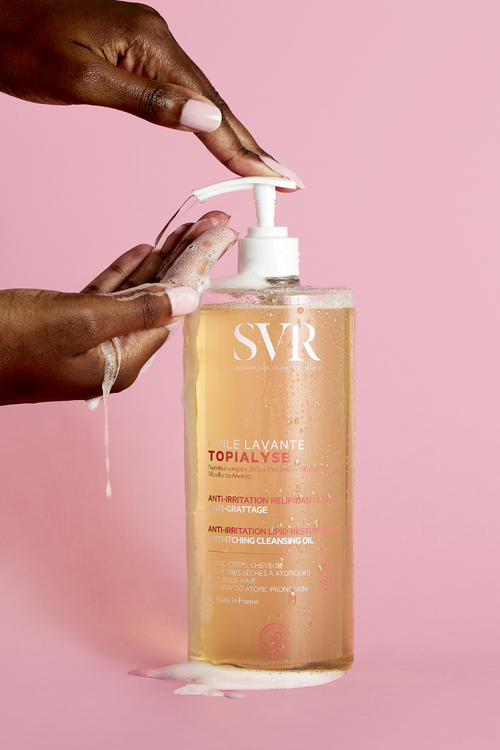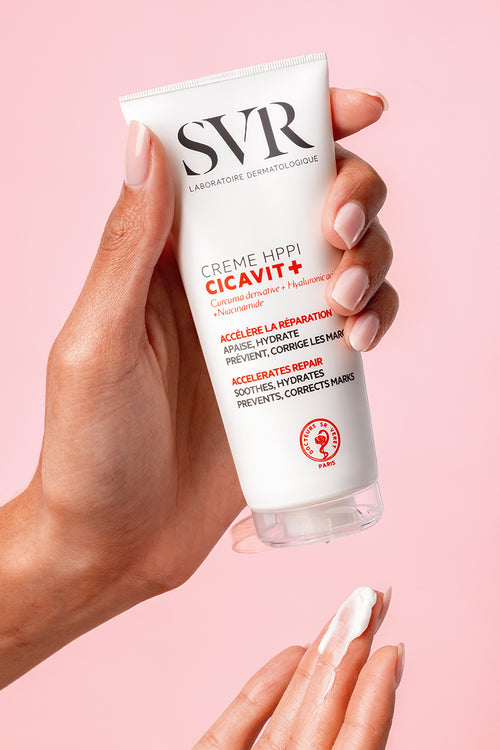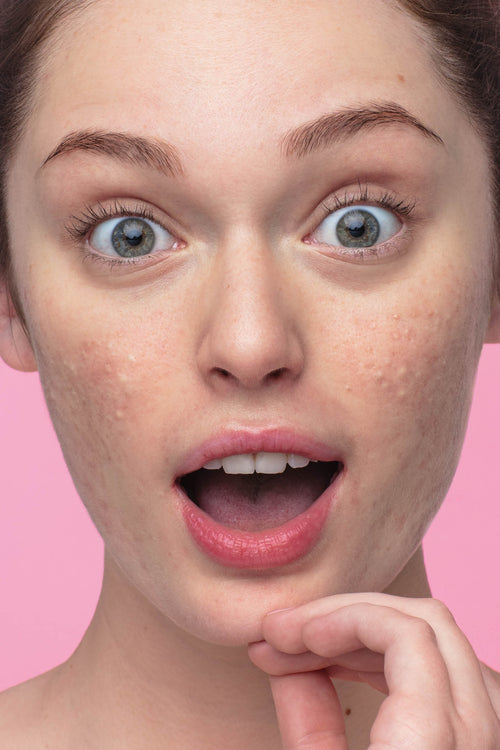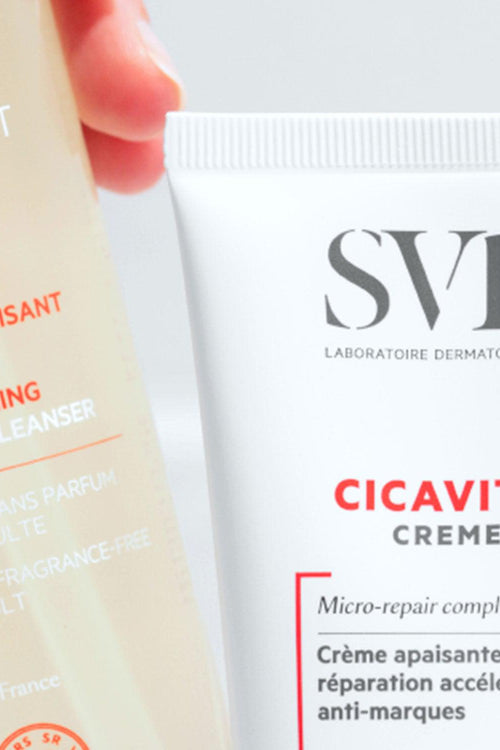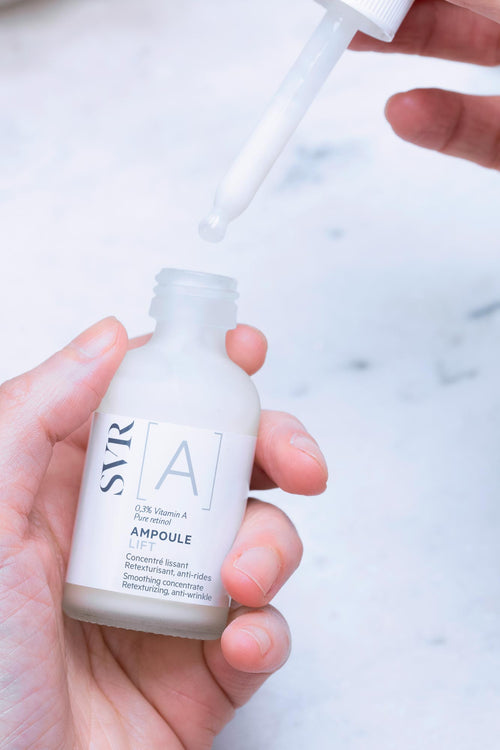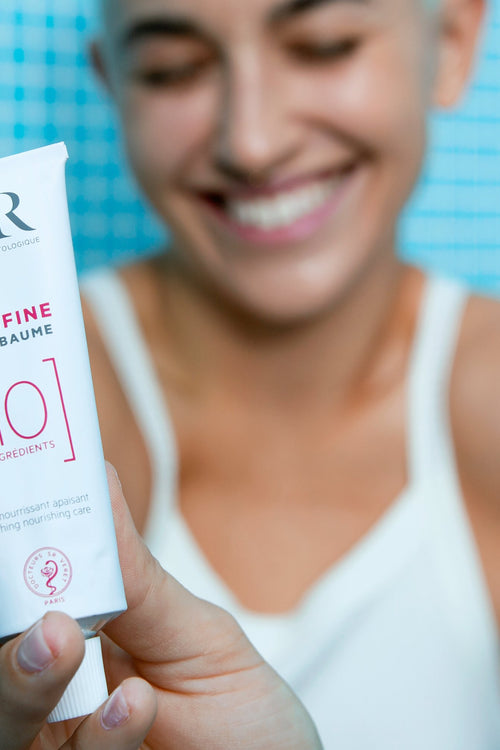Skin allergies know better, feel better about yourself!
It scratches, it gets hot, it pulls, it makes patches, it goes away and it comes back…. No, it's not a little thing. This heightened sensitivity may hide a real skin allergy. Especially since today, the figures continue to rise: 10% of French women are affected by contact allergies to nickel, 1 in 5 children present with atopic dermatitis and it is estimated that in 2050, 50% of the population will be affected by allergies, half of which will result in skin manifestations.
So hypersensitive or allergic? The #biendansmapeau SVR team and Dr Laurence Risse, Dermatologist, help you better decipher the signs and give you all the keys to rediscover the pleasure of soothed skin.
Dr Laurence Risse, explain to us…
• What are the origins of skin allergies?
We are not born allergic, we become allergic! An allergy is a disruption of the immune system. The latter becomes intolerant to a seemingly harmless substance, the allergen, once he has encountered it several times. As with other types of allergies, it is difficult to determine an origin. It can be contact: following the use of a cream, a new shampoo or the wearing of jewelry. But it can also be triggered by taking medication or eating food.
• Is sensitive skin allergic?
Not necessarily. But sensitive skin is suffering skin and this can be a contributing factor. Their skin barrier is altered: there are flaws in its role as a protective shield. Sensitive skin may therefore be more fragile when faced with allergens.
• Is the environment an aggravating factor?
Surely yes. We are in contact with more and more substances, whether of natural or chemical origin. Women, for example, sometimes use many beauty products in their daily ritual (serum+cream+base+UV protection), and these products sometimes have very long ingredient lists! Add to that hair coloring or wearing nickel jewelry then external and even internal pollution (with household products) and this gives you a very small overview of the number of substances that the body encounters every day!
• Our lifestyle too?
We also know today that in Western countries, people tend to strip their skin by washing too frequently and with sometimes very aggressive products. The microbial flora which is on its surface and which also has a very important protective role, is then altered, and this certainly has an impact on the increase in skin allergies.
• Who is most affected?
I would say women, because they are the ones who use the most products on a daily basis. But more and more children are also reporting atopic dermatitis and toddler eczema. This allergic skin reaction comes from the same gene as asthma or hay fever, so it often appears hereditary. Fortunately, unlike skin allergies that appear later, it generally disappears as children grow up. Finally, we are also seeing more and more cases of “professional” skin allergies, such as among cooks or hairdressers-colorists.
• What are the treatments ?
Most of the time, treatment begins with the prescription of topical corticosteroids, while research into the allergen is carried out. But once the cause is identified, the only truly effective “treatment” is total avoidance: you must no longer be in contact with the cream, the food, the molecule, the material that triggers the allergy.
Can an allergy go away?
Unlike “classic” allergies, desensitization does not work with skin allergies, they remain lifelong. Fortunately, by avoiding the allergen and adopting a few reflexes, it is entirely possible to control and soothe attacks.
1/ Hypersensitive or allergic, know the difference
“My skin can’t stand anything anymore! » In order to adopt the right gestures and beauty rituals to quickly soothe it, it is important to clearly distinguish sensitive skin from allergic skin, and this is not always easy. Here are some tips to help you self-diagnose your symptoms.
I am hypersensitive if: My skin reacts in an exaggerated way to anything that can attack it. In short, it becomes red, uncomfortable and tight, in contact with cold, heat, a towel that is too rough, soap that is too detergent, but also in the event of increased stress or after a festive evening.
I am allergic if:
• I have hives: I see red and/or pink edematous patches suddenly appear (raised) on any area of the body. They are itchy and can sometimes change place.
• I have eczema: My skin shows small red itchy blisters that break and ooze as soon as I scratch them. Unlike hives, they do not change place and do not disappear within a few hours.
What you need: products that combine immediate comfort, sensoriality and maximum tolerance.
2/ The look, the other sensitive area
The eyelids have thinner skin, 4 times thinner than the rest of the face, also more permeable and are constantly used by more than 10,000 blinks daily! In just a few years, they have become one of the new favorite areas for skin allergies: ¼ of the population today has allergic eyes.
Symptoms: On the eyelids, allergies mainly result in attacks of eczema. The eyelids swell and itch: very disabling symptoms sensoryally but also socially because these reactions are often very impressive visually.
What you need: Products that quickly soothe redness and discomfort, high tolerance, hypoallergenic, with physiological pH and tested under dermatological and ophthalmological control.
3/ Cosmetic ingredients that save
Panthenol: the ultra-safe “fire-resistant” pharmaceutical active ingredient! Thanks to its calming properties, it lastingly soothes feelings of discomfort.
Aloe vera: the “oasis” plant par excellence! It provides a shot of intense hydration to the skin that can last up to 8 hours. Its plus: it also has soothing properties.
Shea butter & squalane: the unbeatable “nourishing” duo! This complex with emollient and hyper-hydrating properties is in perfect affinity with dry and very dry skin, it nourishes it intensely.
Glycyrrhizic acid: the SOS anti-itching ingredient! Extracted from licorice root, this “sedative-like” acid inhibits the inflammatory cascade and reduces the irritation threshold of the fragile eye area.
4/ Minimal list formulas, new allies
It's what ? It's a new trend on the cosmetics planet, like a return to the essentials: formulating products that are safer for the skin with a limited number of ingredients, 10 and sometimes even fewer. This desire to simplify, to shorten the compositions involves the use of a maximum of ingredients of natural origin, by the removal of everything which is not really useful for the formula and for the skin, but also to anything that can cause controversy such as endocrine disruptors.
Why does allergic skin love it? The higher the number of ingredients, the higher the risk of developing an allergy! By opting for products with short INCI lists, not only is the probability of reacting reduced, but the allergen will also be easier to identify if there is a reaction. These formulas are generally specially designed for hypersensitive and/or poly-allergic skin with ultra-high tolerance active ingredients, handpicked for their ability to soothe attacks and space them out.
5/ 3 tips to reconcile with your allergic skin
Shower sensibly: no more than 37°! The shower must be lukewarm to be well tolerated by the skin, especially if it is hypersensitive. It shouldn't last too long either. In fact, water attracts water and after 5 minutes, the skin dries out: a new attack on your already fragile skin.
Calm your stress: in the embryo, the skin and the brain are made of the same structure, it is only later that they differentiate. The relationship between the two is therefore very close. This is why a bout of stress or severe fatigue can trigger an eczema attack.
Avoid essential oils: they are all the rage because they are completely natural but unfortunately, they can be a real nightmare for people with allergies. Their molecules expose the body both through the respiratory tract and also through skin cells. In addition, some of them contain common substances. If in doubt, it is better to abstain!
Testify, ask your questions or share your experience with us on our Instagram account.





